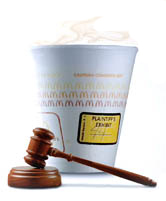A confluence of a couple different thing brings about today’s guest blog by H. Q. Nguyen. First, there was the terrific presentation by Brian Tannebaum down in Florida about online marketing and ethics. His talk runs 50 minutes and is time well spent, not only because you get to see a blogging lawyer in action doing what he does best — trying to pursuade a group of people by marshaling the evidence — but because his talk just might save one or two sad souls from selling themselves off to a demon marketer.
And second was the premier on HBO of Hot Coffee, which addresses many of the perceptions of the citizenry regarding our profession, and how it is that those perceptions were formed.
Nguyen brings home a point that should be evident to all of us concerning the damage some lawyers do with crappy marketing…
————————————————
I’m a personal injury attorney and proud to serve those who’s lives have been damaged due to negligence. Due to those in the profession, people are able to seek just compensation for their losses from those that caused it.
Yet the public perception of the typical PI attorney is that of a greedy, cheesy ambulance chaser who does nothing more than bring frivolous lawsuits causing their insurance premiums to rise as well as hindering societal progress. How can this be?
We can put part of the blame on the insurance companies who spend an enormous amount of money on tort “reform” and marketing in order to influence the public (and the jury pools).
But let’s start with a look in the mirror first. If we want the public to see who we really are, we need to first change the way we present ourselves.
For example, everyday, millions of New Yorkers ride the New York City subways on their way to and from work or wherever they are going. When the typical Joe looks up in the subway car, he sees advertisement from PI firms. Instead of the content conveying that the firm helps those recover for harms caused by the negligence of others, all Joe sees is dollars, millions of dollars. What does that ad convey to a typical viewer who earns $35,000 -$50,000 a year? What does that ad convey to Joe, who may be on his way to serve as a juror?
While these ads may be effective in bringing in clients for the firm who pay for these ads, it harms the profession as a whole. Until we police ourselves and reign in these dollar-centric ads, we cannot hope to change the public’s perception of our profession. We are in essence our worst enemy.
